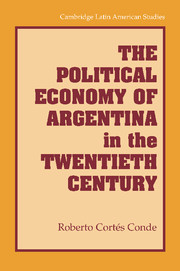Book contents
- Frontmatter
- Contents
- Acronyms
- Acknowledgments
- Introduction
- 1 Period of Rapid Economic Expansion: 1880–1914
- 2 From World War I to the Great Depression of 1930
- 3 From the 1930 Financial Crisis to World War II
- 4 The Political Economy of Peronism
- 5 A Divided Society, 1955–1973
- 6 The Long Decline
- Epilogue
- Statistical Appendix
- Bibliography
- Index
- Titles in the series
- References
5 - A Divided Society, 1955–1973
Published online by Cambridge University Press: 28 August 2009
- Frontmatter
- Contents
- Acronyms
- Acknowledgments
- Introduction
- 1 Period of Rapid Economic Expansion: 1880–1914
- 2 From World War I to the Great Depression of 1930
- 3 From the 1930 Financial Crisis to World War II
- 4 The Political Economy of Peronism
- 5 A Divided Society, 1955–1973
- 6 The Long Decline
- Epilogue
- Statistical Appendix
- Bibliography
- Index
- Titles in the series
- References
Summary
Introduction
The title of this chapter is meant to highlight the turbulent political circumstances that surrounded economic activity during the eighteen years that began with the fall of Perón and ended with his return to power in 1973. The serious conflicts that the Argentines experienced happened under an international framework characterized by the Cold War, which, although it was a cohesive factor for Western Europe – under the Pax Americana – had negative effects on Latin America. Added to the chronic instability of the region were military interventions that were supposedly intended to prevent civil governments from falling under communist influence, perceived as an imminent threat once Cuba became part of the Soviet bloc.
The division among Argentines did not begin in 1955, however. There were already deep societal schisms beginning during World War II, more specifically when a military junta from the GOU (Grupo de Oficiales Unidos), sympathetic to the Axis powers, took over the government in 1943. When the Allied powers experienced military success, a broad swath of society intensified its opposition to the government hoping that with victory against the Nazis, the strong Allied pressure would help return Argentina to democracy. However, the 1943 military junta, which was the closest thing to an authoritarian government that the country had known, was not overthrown. There were two essential ingredients of the military government's continuity: First, the United States preferred solid, anticommunist governments, as in the case of Spain.
- Type
- Chapter
- Information
- The Political Economy of Argentina in the Twentieth Century , pp. 194 - 243Publisher: Cambridge University PressPrint publication year: 2008



